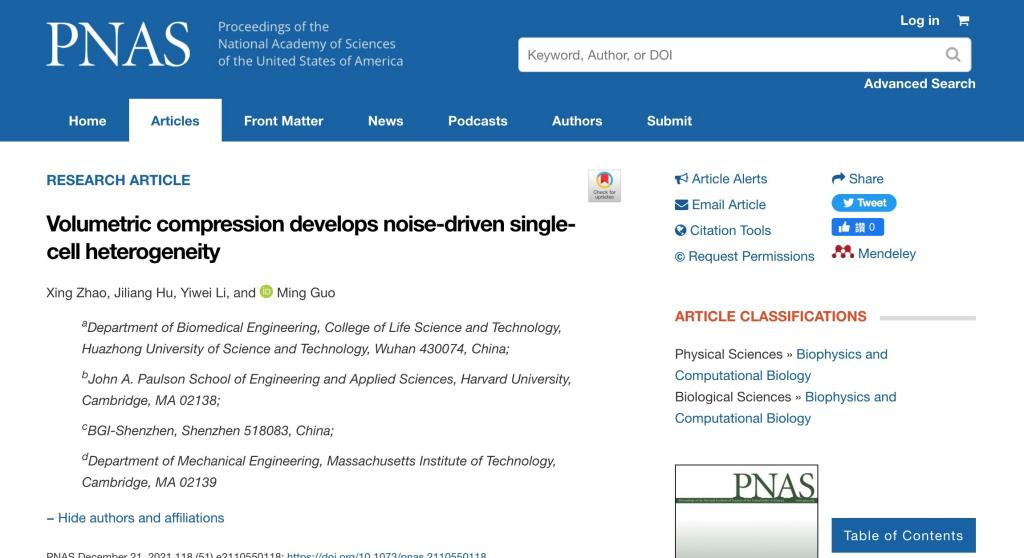On December the 16th, Professor Yiwei Li from the College of Life Science of Technology of Huazhong Unviersity of Science and Technology, together with Prof. Ming Guo from the department of mechanical engineering MIT publish a research paper entitled “Volumetric compression develops noise-driven single cell heterogeneity” in on the journal PNAS.
Prof. Yiwei Li from Huazhong University of Science and Technology and Prof. Ming Guo from MIT were the co-corresponding authors. This study has received the financial support from the National Natural Science Foundation of China, the Fundamental Research Funds for Central Universities HUST. This study also received technical support from Dr. Wenshan Zheng at MobiDrop.inc.

A multicellular biological system, such as organ, tumor and embryo, is composed of a complex network of heterogeneous yet closely related cells. Biological heterogeneity is well organized on several orders of scales, and is always originated from a single homogeneous population of cells. Recent studies have shown that extensive genetic and phenotypic variations exist not only between cell types but also within a seemingly homogenous population, which suggest a hint of the origin and causality of cellular heterogeneity. Indeed, various biological and genetic origins of heterogeneity have been revealed, including genomic instability, stochastic gene expression, heterotypic chromosome segregation, epithelial–mesenchymal transition (EMT), as well as spatiotemporally regulated stimulations of morphogens. Despite extensive studies of biological and genetic causes of genetic and phenotypic heterogeneity, little is known about the impact of physical microenvironments on heterogeneous cell-fate decision.

This paper reports that the physical compression can induce distinct phenotypic subpopulations from its original homogeneous population of cells. The result shows that a single physical input can induce multiple differential outputs of cell fates in the same type of cancer cell. This work finds that the newly-generated subpopulations from physical compression gain the signature genes of epithelial-to-mesenchymal transition and the genes associated with cancer stem cells. Furthermore, this work shows that compression increases gene expression noise, which interplays with regulatory network architecture and thus generates differential cell fate outcomes. The experimental observations of both single-cell sequencing and single-molecule fluorescent in situ hybridization (sm-FISH) agrees well with our computational modelling of regulatory network in EMT process. These results suggest that the physical compression may promote the evolution of tumor in an ecological way, highlighting a spectral interaction between the physical microenvironment and the ecological components of developing tumors.
Prof Yiwei Li recently started up his lab in our college since the Dec, 2020, after leaving MIT. He studies the mechanoregulation and biophysics in 3D organoid growth and stem cells. Their goal is to probe, understand, and engineer the physical properties of 3D multicellular living systems, as well as their crosstalks with gene expression, epigenetic modification, and protein condensation. His recent works in last 2 years have revealed the mechanoregulation of organoid and stem cell reprogramming, mechanoregulation of Wnt/β-catenin signaling, mechanoregulation of phase separation of LRP-AXIN signalosome, mechanoregulation of gene stochastic expression and mechanoregulation of formation of tumor heterogeneity (Cell Stem Cell, 2021; PNAS, 2021; Matter, 2021; Science Advances, 2020; PNAS, 2019; Analytical Chemistry 2021; Lab Chip 2021). Prof. Yiwei Li actively recruit undergraduate students, graduate students, Postdocs, and research assistances who with passion and willingness to do research. Please directly conduct Prof. Yiwei Li if you are interested.